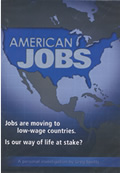Related
Articles:
How Global Taxation Will Come in The Back Door of American Foreign Policy
Other
Ryter
Articles:
The Two Kerry's:
War Hero or
Traitor?
"Men in Black" The Cult of The Judges
CHIRAC
CALLS FOR GLOBAL TAX
By Jon Christian Ryter
February 9, 2005
NewsWithViews.com
French president Jacques Chirac floated the idea of imposing a $10 billion international tax to fund additional research on AIDS at the World Economic Forum last week in Davos, Switzerland, as well as an education program that Chirac insists will half new cases of HIV. "Today," Chirac said in a prepared endorsement of what he declared would be an "experimental" tax (since, by its own charter, the United Nations is forbidden from taxing anyone), "I propose to forge ahead by creating an experimental levy to finance the fight against AIDS." Chirac addressed a crowd of world business leaders, global politicians and celebrities. Attending the meeting in Davos was former President Bill Clinton who was just named by UN Secretary Kofi Annan as the "tsunami envoy"�thee UN's point man on tsunami reconstruction. The status as special envoy of the Secretary-General is a plum that will look well on Clinotn's resume as the former president vies for the office of Secretary-General although, by the UN Charter which forbids national leaders from heading the global organization, he is technically ineligible to seek the job but is, nevertheless, actively "campaigning" for it.
Chirac noted that the money to fight AIDS and other diseases that are ravaging the third world could be raised by one of several methods�including a tax on international financial transactions; a special levy on currency trades, a tax on the fuels used by airlines for international flights; or by taxing the fuels used by sea-going vessels that travel the international waterways of the world. Not specifically mentioned by Chirac�but the method of taxation that would most likely be implemented once the right to tax is approved�would be a one-day tax on the wages of the workers in the wealthy nations, assessed and collected by that nation's government, and surrendered to the UN with the funds that nation normally contributes to the upkeep on the UN.
Chirac's proposal came at the moment that the World Heath Organization is attempting introduce an antiretroviral therapy [ARV] program. (Antiretroviral drug therapy inhibit the replication of HIV by slowing the process down and delaying the advent of each new phase of the disease. It is not a cure.) In 2002 Ann Sheehy, a postdoctoral fellow working as a Senior Research Associate in the Department of Infectious Diseases at King's College in London, isolated an anti-HIV protein in human DNA. The protein has been named APOBEC3G. Although the precise function of APOBEC4G is unknown, it appears the protein protects cells from viruses by altering their geonome. The alterations performed by APOBEC4G is so radical that the virus can't survive. Sheehy spent 10 years examining two DNA strands that differed by only 200 genes. Even after she narrowed it down to 10 strands, it still took three years to find the correct gene. Once she identified the gene, scientists were then able to identify the specific protein that could be used to attack HIV-4.
While Sheehy's discovery is improving the quality of life of the AIDS patient it does not, as yet offer either a cure or a vaccine that will prevent the disease. None of the AIDS drugs developed to date will prevent or cure AIDS. Nor will they keep the HIV-positive patient from dying. The new generation of AIDS-fighting drugs simply prolong the life of the infected person by slowing down the progression of the disease. But everyone who becomes HIV-positive will ultimately get full-blown AIDS�and everyone who gets AIDS will ultimately die a horrible death as a result of it�whether they succumb to the disease itself or die from one of the immune deficiency diseases that develop as a direct result of AIDS.
Because the United Nations Charter precludes the UN from imposing any type of tax whatsoever, the media asked U.S. Treasury spokesman Tony Fratto what President George W. Bush thought about Chirac's idea of creating what would amount to as a world tax. Fratto responded that "...[t]he United States is not inclined to support international taxation schemes."
British Prime Minister Tony Blair, who is fighting an uphill battle to keep his Labour Party majority in the Parliament and, at the same time, to boost his own popularity within the Labour Party and among the British citizens, was asked a similar question. Blair responded that he had not studied Chirac's proposal, but felt it was necessary to leave all of the options on the table. The simple truth is, England, France and Germany, like the United States, are suffering tremendously from the affects of globalization. Adding a $10 billion global tax�that will be assessed only on the wealthiest 22 nations�to fight AIDS on top of another proposed increase in the levies paid by the wealthiest nations that will amount to over $125 billion more per year by the end of this decade goes beyond the pale. Particularly since the economies of the developed nations are rapidly shrinking as the jobs drain continues. In fact, when the Kyoto Protocol goes into affect next week, the jobs drain will intensify as the industrial nations are required to meet even stiffer environmental regulations under the climate change treaty
Most of the politicians present were skeptical that Chirac would be able to generate enough support from the international community to push such an unpopular�and illegal�tax through. One of those who was skeptical Chirac's idea would get off the ground was Bill Clinton, since he knows first hand the reaction of the American people to a UN tax since most Americans not only want the United States out of the UN, they want the UN out of the United States. (Which is one reason the UN hierarchy is working to change the rule that currently disallows a current or former national leaders from serving as UN leader. Clinton is viewed by the socialist European Union as a very popular two-term American president whose election as head of the UN would, they believe, do much to make the American people believe the UN really was an American institution created by FDR and Winston Churchill when in fact it is the evil stepchild of the League of Nations, conceived by the fornication of European and American bankers who climbed into bed with Woodrow Wilson.
Clinton wisely suggested that Chirac forget his tax, since it is too divisive. "It seems to me," Clinton told the gathering at Davos, "we don't want to get diverted into debating [a tax for AIDS research]," adding that any discussion of that type would drive a wedge into the conference and likely would not attract widespread support from the international communities.
Ian Vasquez, Director of Global Economic Liberty at the libertarian Washington, DC think tank Cato Institute agreed with Bill Clinton. "I think [Chirac's] proposed tax] is reckless," he said. "International organizations already have a problem with accountability, and giving them a constant stream of revenue would make them less accountable than they already are. It seems like [Chirac] is just creating headlines for himself." It could very well be that, with the rules relaxed about current or former leaders serving as Secretary-general of the UN, Chirac may be putting himself up as an alternative to Clinton.
G-8 leaders are considering several proposals to help Africa, which is the most AIDS-infected continent in the world. Sub-Sahara Africa is the poorest region in the world, with 70% of its population living on less than $2 a day. While the World Health Organization [WHO] projects that one million people in that region will die from malaria this year, they also estimate that well over two million will die from AIDS. That region received $26 billion in net aid in 2003 (the last year with complete figures). Over half of that money� $16.25 billion�came from the United States. Aid agencies have been imploring the United States (which gives less of its GNP in relief aid than any other industrial nations) to double its spending�particularly in Africa, and specifically to fight AIDS. But Chirac's radical rethinking of AIDS research, treatment and education spending is meeting strong opposition in the United States and the other industrial nations that are expected, by the UN and WHO, to shoulder 100% of the cost. The UN insists the additional funds are needed since they are now treating 75% more people than they did in 2003�and 700 thousand patients in Africa are now getting antiretroviral therapy, up from 440 thousand six months ago.
But the furor that has ignited even more negative feelings for the UN in the United States is not the request from WHO for more money, but the Chirac proposal that the UN simply take the money by imposing an international tax on the wealthiest nations.
Once a legal precedent�an unchallenged tax�is established through which the UN is construed to have the right levy a tax within the invisible emprey of the UN, that precedent will be upheld by the World Court in the Hague and a bevy of "international taxes" will result as the UN attempts to fund itself through the sweat equity of the world's employed. By the end of the next decade�if not this one�the UN will levy a 1% income tax on all of the employed workers throughout the world to fund its world government (as it assures the taxpaying nations that it will never seek more). But, since taxes are the fuels by which the engines of government run, and because governments with the funds to do so will always increase both their size and their need for more tax dollars, you can expect that 1% UN tax to rapidly rise as the globalists discover they possess the means to fund their grandiose schemes with the sweat equity of the world.
On January 16, 1996 the mainstream media announced that the United Nations was "contemplating" a global surcharge on international air travel to support its sagging coffers. Instead of demanding to know where the UN gained its authority to tax American travelers and American airline companies, former Senate Majority Leader Bob Dole [R-KS], the 1996 GOP presidential candidate, responded by declaring that if the UN persisted with its plan to implement a global travel tax, the US Congress would have no alternative but to withhold funding from the UN�suggesting by his statement that the UN already possessed thee prerogative to tax.
Where did that authority come from? Certainly not from its charter. The UN Charter was very specific in this area. Funding for the UN was to come exclusively from voluntary contributions from the member nations. That, by the way, was pretty much how the US government was funded under the Articles of Confederation. That changed with the ratification of the Constitution of the United States�our second governing charter. In that "charter," the federal government of the United States was created subservient to the State governments�just as the UN was created subservient to the nation-states that created it. The parallel is unmistakable simply because the UN�and the League of Nations before it�were deliberately created from that model.
And just as the Federalists under
Alexander Hamilton, John Adams and John Jay loaded the federal court
system with likeminded Federalists (Jay became the first Chief Justice
of the Supreme Court), the European Union's World Court has been
loaded with likeminded globalists. Just as the federalist judges in
the first 150 years of the United States legislatively adjudicated a
supremacy for the federal government over the States that did not constitutionally
exist, the globalists within the World Court are now doing the same
by redefining national sovereignty�granting the nation-states the right
to adjudicate internal sovereignty issues while reserving external sovereignty
issues in the invisible emprey of internationalism (where nations collide
economically and politically), to the UN. Since this is the UN's second
attempt to legislate an international tax, you can expect a court challenge
soon. That challenge will be heard by the World Court which will rule
that not only does the UN have the right to levy a tax to implement
the programs demanded of it by the nation-states, it has an obligation
to do so.
� 2005 Jon C. Ryter - All Rights Reserved
Order Jon Ryter's book "Whatever Happened to America?"
Sign Up For Free E-Mail Alerts
E-Mails
are used strictly for NWVs alerts, not for sale
Jon Christian Ryter is the pseudonym of a former newspaper reporter with the Parkersburg, WV Sentinel. He authored a syndicated newspaper column, Answers From The Bible, from the mid-1970s until 1985. Answers From The Bible was read weekly in many suburban markets in the United States.
Today, Jon is an advertising executive with the Washington Times. His website, www.jonchristianryter.com has helped him establish a network of mid-to senior-level Washington insiders who now provide him with a steady stream of material for use both in his books and in the investigative reports that are found on his website. E-Mail: BAFFauthor@aol.com
Because the United Nations Charter precludes the UN from imposing any
type of tax whatsoever, the media asked U.S. Treasury spokesman Tony Fratto
what President George W. Bush thought about Chirac's idea of creating
what would amount to as a world tax.










